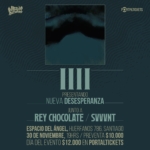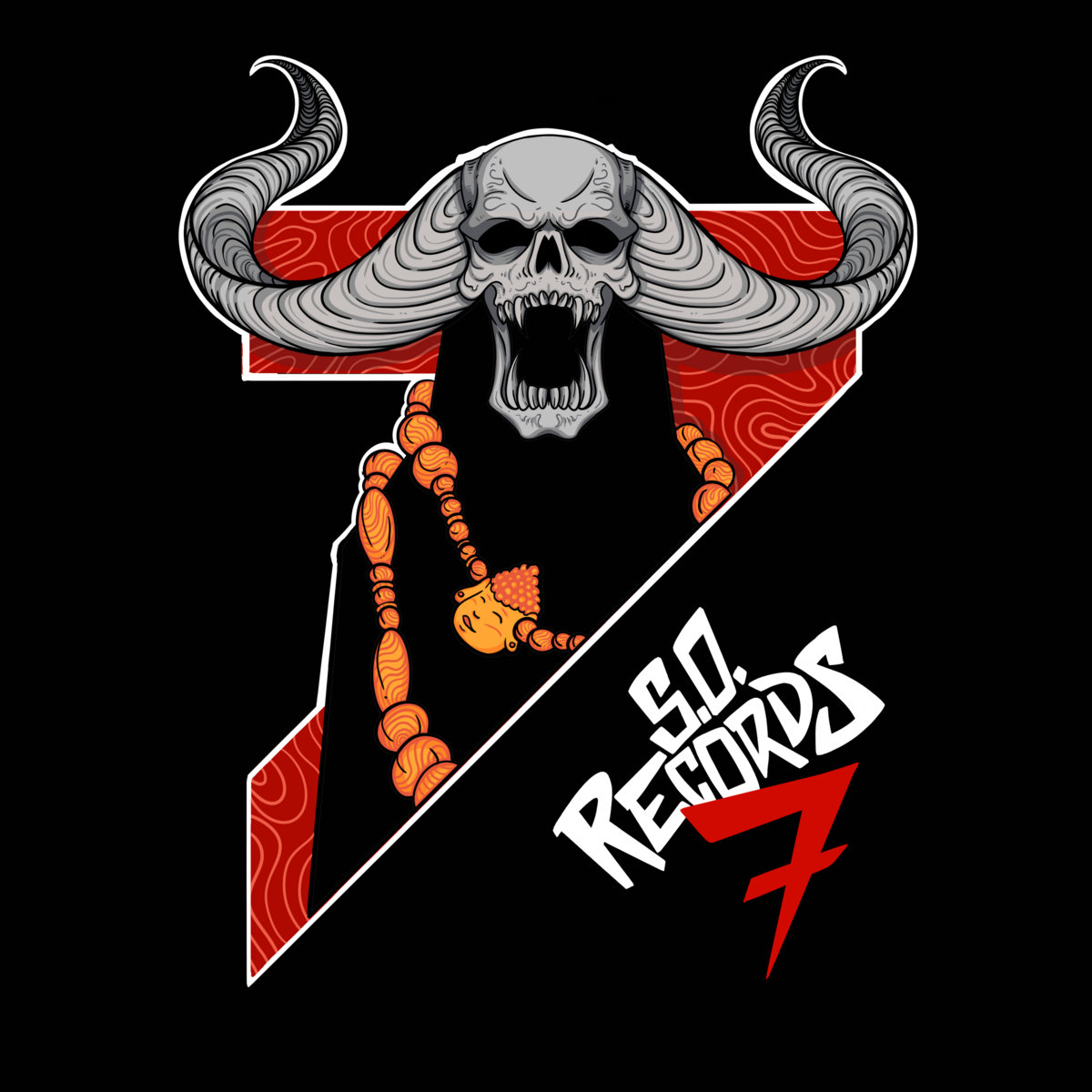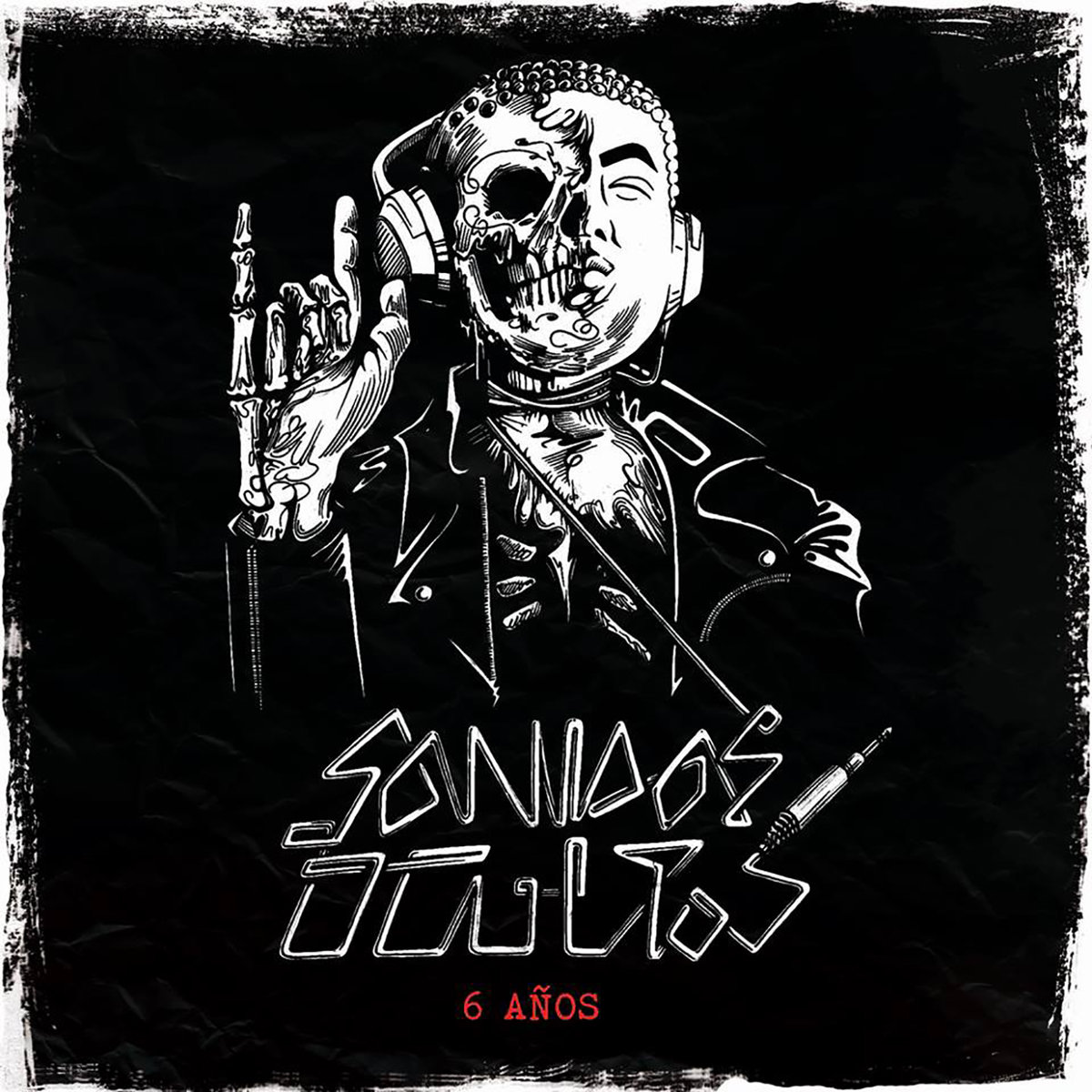

El Eco de las Ánimas – Oro por Espejos (2019)
martes 19 de marzo, 2019
Escrito por: Álvaro Molina


- El Eco de las Ánimas
- Oro por Espejos
- ¡Haz clic para puntuar esta entrada!(Votos: 0 Promedio: 0)
- Escucha nuestra música
“De los sueños rotos forjó su misión; oro por espejos, capital creó. La profecía esperada sangre derramó, años como esclavos y nada cambió” son sólo parte de los versos que arman la canción que da título a este disco. Críticas descarnadas, haciendo ecos de fantasmas del pasado y de las ánimas que continúan penando en tiempos modernos. Porque para Israel Aguirre, bajista y letrista para El Eco de las Ánimas, este segundo esfuerzo de la banda recoge, recorre y responde a mucho de lo que aún nos sigue obsesionando. En una entrevista para el diario El Centro, ‘Oro por espejos’ tiene una referencia clara y explícita, pero con connotaciones que no se reservan exclusivamente al pasado: “[el título del disco] alude a una especie de transacción que se daba en los tiempos de cuando llegaron los españoles; los indígenas entregaban su oro a cambio de espejo, era como sacar provecho de los más débiles”.
A fines del año 2012, Pedro Ormazábal (guitarra), Diego Díaz (batería) e Israel (bajo) formaron El Eco de las Ánimas como un proyecto más serio para despegarse de las otras bandas en que habían estado hasta ese momento. Provenientes de la zona costera del valle del río Mataquito, poco a poco se han hecho un espacio en la vibrante escena local que los rodea: Curicó, Talca y Concepción rápidamente vieron sus presentaciones en vivo, llegando al oído de Feliciano Saldías (Machuca, Zurdaka) quien mezcló y masterizó ‘Antaños’, el primer esfuerzo de una banda que hace guiños a las tradiciones del rock progresivo mientras inyecta el brío abstracto y espacial de la neo-psicodelia. Los shows y tocatas fueron y vinieron, marcaron tarjeta en tres ediciones consecutivas del Festival Woodstaco y paulatinamente su nombre ya comenzaba a hacer ecos también en el público. Con la llegada del año 2017, sumaron a sus líneas la poderosa voz de Rodrigo Llanos y la guitarra de Fernando Lizama para dar forma a ‘Oro por Espejos’, una continuación (y expansión) de sus raíces y forma de interpretar el sincretismo entre el mundo progresivo y el psicodélico, enredando un espectro que incluye rastros de blues, folk y jazz; desde Congreso y Los Jaivas, hasta Fósil y Alásido.
Y es que ‘Oro por Espejos’ se sostiene a sí mismo entre paisajes musicales variados e interconectados que exploran diferentes mundos desde una misma raíz que no le teme a la actitud contestataria y rebelde del rock. Tal vez ahí es donde quizás se esconde esa verdadera identidad de El Eco de las Ánimas, la cual sale a flote en estos cinco temas donde cada acorde, melodía y ritmo sirve como un virtuoso vehículo musical para que el quinteto exprese su mensaje, apoderándose de las contingencias y temáticas que hoy en día diferentes medios bombardean con información, un ambiente donde se vuelve difícil discernir mensajes y opinones. En “Desfile del Absurdo” hay una emotiva contribución hacia la causa feminista, donde Llanos canta que “Parece necesario, romper el hechizo, ese que te bota de los libros de historia, ese que te encierra entre cuatro paredes, por sólo colocar en el dedo un anillo […]”. En la ingeniosa canción homónima al disco, es el turno del poder, ese concepto que Orwell definió como la acción de hacer pedazos las mentes humanas para volver a armarlas de una forma arbitraria y a gusto propio, llevándose un palo directo: “El corrompido se ha vuelto inmortal, dejando en claro toda su mala intención, falsa empatía hacia los demás, vive en un mundo paralelo al que traicionó […] Abraza a los que gozan su inmoralidad amparado en la ignorancia de la humanidad, falsas promesas logran distorsionar, las formas de sentir y ver la realidad”.
Las melodías y escapes siderales con que este disco viaja de manera firme y fluida están arregladas perfectamente para entregar sensaciones de angustia, rabia y melancolía, pero abren también un futuro esperanzador, rebelde y épico. En canciones como “La Ciudad de los Escombros Escondidos”, el tono existencialista es oscuro y sombrío, con Llanos encarando en voz lastimosa que “Puedes cerrar al dolor la puerta, pero no ignorar cómo avanza tu decadencia, cuesta en algo creer si de nada tienes respuestas, en la ciudad entre escombros escondidos […]”. Sin embargo, los colores cambian y en “El Valor del Silencio”, “Oro por Espejos” y “El Porvenir que no Veré”, la música se convierte en un poderoso rampante que, con virtuosismo, combina y compejiza ritmos y estilos para entregar mensajes de resiliencia y trascendentalismo, al amparo de una salvación en la libertad (”El alma irá andando por caminos de ilusión, ignorando el pasado, manos limpias de rencor, respiro el alivio, paso a otro mundo es tiempo de descansar”). Considerándolo todo, para este esencial segundo trabajo El Eco de las Ánimas buscó, subliminalmente a través de letras reflexivas y subversivas – y múltiples colores y paisajes musicales -, hacernos recordar que para algunos “el método más efectivo para destruir a las personas es negar y borrar su propio entendimiento de la historia”. Y ahí es cuando – como seres humanos – no podemos permitir que nos cambien “oro por espejos”.
(English)
“From broken dreams he forged his mission; gold for mirrors, capital he created. The awaited prophecy shed blood, years as slaves and nothing changed” are just part of the verses that shape the title track of this album. Emaciated social critiques, echoing ghosts from the past and spirits that continue to punish at modern times. For Israel Aguirre, the bassist and subversive lyricist of El Eco de las Ánimas (”The Echo of Spirits”), his band’s sophomore effort gathers and roams and responses to much of what still haunts us. In an interview for ‘El Centro’ journal, ‘Oro por Espejos’ (’Gold for Mirrors’) has a clear and explicit reference with connotations that aren’t exclusively bounded by the past: “[the album’s title] refers to some kind of transaction in the Conquista times, where Spanish conquistadores traded gold for mirrors with the Indians. It’s a way of saying that the powerful take advantage from the weak ones”.
At the end of 2012, Pedro Ormazábal (guitar), Diego Díaz (drums) and Israel (bass) founded El Eco de las Ánimas as a “more serious” musical project than the other bands some of them had until that time. Hailing from the valley of the Mataquito River (Región del Maule), the band has slowly positioned itself in the scene that surrounds them: Curicó, Talca and Concepción rapidly saw their first live performances and the music came to the ears of “penquista rock” guru Feliciano Saldías (Machuca, Zurdaka), who mixed and masterized ‘Antaños’, first EP of a band that showcases and winks a great old-school prog-rock influence while injecting the powerful verve of spacious and abstract neo-psychedelia. And so, live shows came and went, they yelled “Here!” at Woodstaco Festival on three occasions and their name was already beginning to make an echo on the Chilean audience. In 2017, they added Rodrigo Llanos and his broad, melodic vocals, and Fernando Lizama (guitars) in order to materialize ‘Oro por Espejos’, a continuum and expansion of their roots and way of re-interpreting the syncretism between the psychedelic and progressive world, intertwining a spectre that includes traces of blues, folk and jazz; from the classical school of Congreso and Los Jaivas, to contemporary acts like Fósil and Alásido.
So basically ‘Oro por Espejos’ holds itself between a variety of tightly knit musical landscapes that explore different worlds from the same origin that is not fearful of the rebellious and anti-establishment attitude of rock & roll. Well, maybe there’s where the true identity of El Eco de las Ánimas hides and comes afloat in these five tracks, in which every chord, melody and rhythm serves as a virtuoso vehicle for this band to deliver its message, seizing the contingency and trending themes that media constantly covers and bombs nowadays; an environment with a thematic maelstrom of messages and opinions where the discern is in ways of becoming a titanic odyssey. On “Desfile del Absurdo” (’Parade of the Absurd’) there’s an emotional contribution towards the feminist cause, with Llanos singing “Seems necessary, to break the spell, the one that kicks you out from history books, the one that locks you in between four walls, just because they put a ring on your finger […]”. On the witty title-track, the acid darts are aimed at power, that concept defined by Orwell as being present “in tearing human minds to pieces and putting them together again in new shapes of your own choosing”. For Aguirre (and in Llanos vocals), thing goes like this: “The corrupted one has become immortal, making clear his twisted intention, false empathy towards the others, lives on a parallel world he betrayed […] Embraces the ones who rejoice on his immorality sheltered in the ignorance of humanity, false promises distort the ways of feeling and seeing reality”.
The melodies and sidereal escapes in which this record manages to travel on a firm and fluid way are perfectly arranged to deliver feelings of angst, rage and melancholy, but they also open a future that can be encouraging, rebellious and epic. In songs like “La Ciudad de los Escombros Escondidos” (”The City With The Hidden Rubbles”), the existentialist tone is dark and somber, with Llanos languidly singing about “You can lock the door to pain, but you can’t ignore how your decadence goes forward, it’s hard to believe in something if you have no answers, in the city between hidden rubbles […]”. However, the colours change and come to another life in “El Valor del Silencio” (”The Worth of Silence”), “Oro por Espejos” (”Gold for Mirrors”) and “El Porvenir Que No Veré” (”The Future I Won’t Gaze”). On these tracks, the music becomes a mighty rampant that virtuously combines and complexes rythms and styles to submit messages of resilience and transcendence, sheltered by a hope of salvation in liberty (”The soul will walk through roads of illusion, ignoring the past, hands clean of resentment, I breathe the comfort, I walk into another world, it’s time to rest”). All in all, in this pivotal sophomore album, the band may have wanted to, subliminally (with reflective and subversive lyrics and multiple chromes and musical landscapes), reminds us that, for some, “the most effective way to destroy people is to deny and obliterate their own understanding of their history”.
Este artículo ha sido visitado 787 veces, de las cuales 1 han sido hoy




























